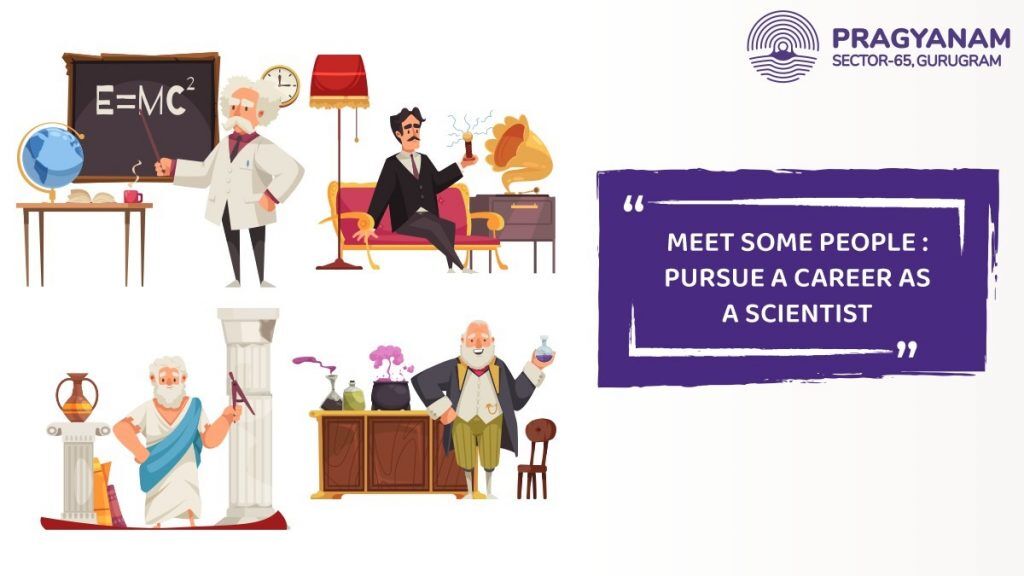So, you’re a fervent admirer of science, aspiring to carve a path as a scientist and pioneer revolutionary innovations? Still, is there a lingering concern about your depth of knowledge in the field? Fear not. Discover a comprehensive guide that unveils the essence of science, delving into the identities of scientists, the intricacies of their work, and beyond. Most significantly, we’ll acquaint you with distinguished scientists, unraveling the tapestry of their lives and groundbreaking inventions. Immerse yourself in this compelling narrative and prepare to be captivated.
Table of Contents
Who are scientists, and what do they do?
A scientist is ‘an individual engaged in systematic research to advance knowledge in a specific area of the natural sciences.’ Additionally, the Science Council provides a broader definition, describing a scientist as ‘someone who systematically gathers and utilizes research and evidence, formulates and tests hypotheses, and shares understanding and knowledge.’ In pursuit of these objectives, scientists extensively employ statistics and data to comprehend complex issues and devise solutions. If there’s one inherent quality that binds all scientists, it is an insatiable curiosity. This innate curiosity propels scientists worldwide to make groundbreaking discoveries and inventions.
We are familiar with stories like Newton’s, who conceived the theory of gravitation by observing an apple falling from a tree. Numerous scientists akin to Newton have made remarkable contributions across various fields, such as medicine, physics, chemistry, and beyond. It’s time to draw profound inspiration by acquainting ourselves with some of these exceptional minds who have significantly propelled the advancement of the world as we know it today. Let’s delve into their stories:
1. Albert Einstein
You’ve undoubtedly heard of the Theory of Relativity. Thanks to this great man, the renowned equation E=mc2 is widely recognized. It’s fascinating to learn that even as a teenager, he penned a paper on magnetic fields. Indeed, his work laid the groundwork for modern astronomy by introducing the idea that space and time are interwoven. Notably, Einstein received the Nobel Prize in Physics in 1921.
Here’s another intriguing tidbit: a film depicting his life and the theory of relativity, featured in the New York Museum, sparked the ‘first science riot in history,’ drawing a crowd even without tickets.
2. Marie Curie
A Polish-born French physicist, Marie Curie was known for her remarkable memory since childhood. She had to take up a job early in life when her father lost all his savings due to a bad investment.
Her marriage to Pierre Curie marked a partnership that led to several significant discoveries now known to the world. Her relentless resolve and insatiable curiosity established her as an icon in modern science. She discovered polonium and radium and was a pioneer in championing the use of radiation in medicine.
In 1903, Marie Curie and Pierre Curie and Henri Becquerel were jointly awarded the Nobel Prize in Physics for their groundbreaking work in radioactivity. Marie became the first woman to receive a Nobel Prize, marking a historic achievement.
3. Issac Newton
Isaac Newton’s contributions to science were manifold. In the field of optics, he discovered the composition of white light by various colors. His contribution to mechanics, particularly through the three laws of motion, is immense. While he is most famous for discovering the law of gravitation, many are unaware that he also pioneered calculus in mathematics.
Interestingly, it is said that the apple tree which inspired his discovery of the law of gravitation still blooms in the orchard of Woolsthorpe Manor and has become a popular tourist attraction.
4. Charles Darwin
A profound curiosity about geology set Charles Darwin on a transformative path. His theory of evolution based on natural selection has profoundly changed our understanding of life. It’s intriguing to learn that his interest in the field began early in life when he started exploring the countryside. His initial observations centered around geological formations, flora, and fauna. All of these explorations eventually culminated in the groundbreaking theory of natural selection.
All these observations and reflections eventually paved the way for the groundbreaking work, ‘On the Origin of Species.
5. Galileo Galilei
Galileo Galilei’s contribution to astronomy cannot be overstated. He is credited with discoveries such as four large moons orbiting Jupiter. He also identified sunspots on the surface of the sun and observed the phases of Venus.
He also made contributions to the understanding of motion and in explaining the earth’s rotation.
His law of inertia influenced future scientists, including Sir Isaac Newton, who built upon Galileo’s work to formulate a comprehensive set of laws of motion.
You must undoubtedly find inspiration in the narratives of these scientists and their monumental contributions. Equally, noteworthy are numerous Indian scientists who have made significant strides in science. Foremost among them are:
Srinivasa Ramanujan is known for contributing to mathematical analysis, number theory & more.
C.V Raman is a noted physicist who won the Nobel Prize in 1930 for his Raman Effect.
Homi Jehangir Bhabha is a theoretical physicist best known as the chief architect of the Indian atomic energy program.
Jagdish Chandra Bose pioneered the investigation of radio and microwave optics.
A.P.J. Abdul Kalam is Known for his crucial role in the development of India’s missile and nuclear weapons programs.
Beyond these notable figures, you must be familiar with the many scientists at ISRO who recently brought pride to the nation with the historic moon landing of Chandrayaan-3!
If the remarkable contributions of these scientists have stirred a desire within you to join their ranks, you undoubtedly seek guidance on how to embark on this journey. A solid starting point is a meticulous study of the fundamentals of science. Following your school education, pursue a bachelor’s degree in science, selecting a specialization that aligns with your interests. Subsequent pursuit of a master’s degree and a doctoral research program in your chosen field will pave the way to achieving your aspirations. Above all, ensure to keep your innate curiosity alive.
At Pragyanam, recognized as the premier CBSE school in Gurgaon, we are dedicated to nurturing our students’ intrinsic sense of curiosity and nurturing a lifelong love for learning.
Now, go ahead and pursue your dreams, making our country proud!,


